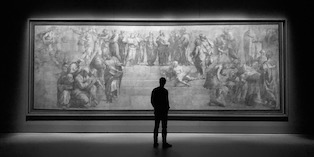Podcast Profile: Exploring Philosophy - Audio
 Site • RSS • Apple Podcasts
Site • RSS • Apple Podcasts22 episodes
2011
Median: 12 minutes
Collection: Philosophy

 Site • RSS • Apple Podcasts
Site • RSS • Apple PodcastsDescription (podcaster-provided):
Have you ever considered what being conscious actually means? By choosing to live in a particular state are you consenting to be subject to all its laws? For some there’s an assumption that philosophy might not be relevant to modern life but Dr. Nigel Warburton, senior lecturer in Philosophy at The Open University argues that many of us today are faced with philosophical questions such as these as we live our lives in the twenty first century. In this collection we ask academics to discuss these questions in addition to other important philosophical issues and concepts such as the morality of abortions and the reconciling a world with evil and a good God.Themes and summary (AI-generated based on podcaster-provided show and episode descriptions):
➤ applied philosophy in everyday life • thought experiments and dilemmas • personal identity • consciousness and self-awareness • faith vs evidence • problem of evil • abortion ethics • political obligation, consent, civil disobedience • Descartes, doubt, knowledge • mind–body dualismThis podcast presents an introduction to major topics in philosophy, linking classic debates to questions that arise in everyday life and contemporary society. It features academic discussion of how philosophical thinking works in practice, including the use of thought experiments to test intuitions and expose tensions in concepts such as morality, identity, and knowledge.
Across the episodes, listeners encounter central problems in the philosophy of mind, such as what consciousness is, how self-awareness might be explained, and whether the mind is distinct from the body. Related discussions examine personal identity and what, if anything, makes someone the same person over time.
The podcast also explores philosophy of religion, focusing on the relationship between faith and evidence and the challenge posed by suffering and wrongdoing for belief in an all-powerful, perfectly good God. Ethical and political philosophy are represented through debates about abortion and the competing rights and moral status of the pregnant person and the fetus, as well as questions about political obligation, consent to state authority, and whether citizens can justifiably refuse to obey laws on moral grounds.
Historical philosophical methods and arguments appear alongside these themes, including attention to Descartes’ use of systematic doubt as a route to knowledge and his dualist account of mind and body. Overall, the content emphasizes analytical reasoning, clarifying concepts, and evaluating arguments rather than offering practical advice or advocacy.